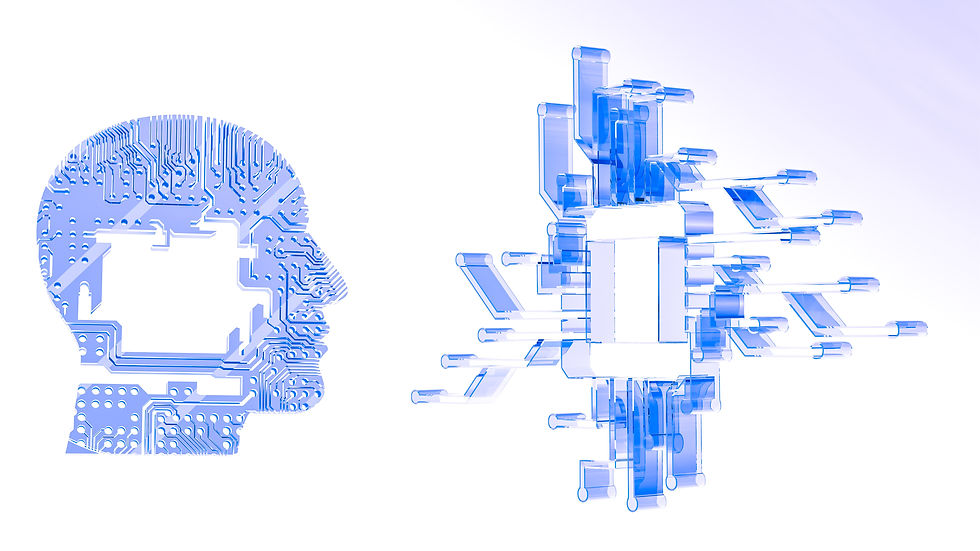How leaders are preparing employees for 2030 Future of Work (Part 1 of 3 Part Series)
- Isabella Johnston
- Jul 30, 2023
- 3 min read

Anywhere you go you find people buzzing about AI. People love it for a variety of reasons and leaders are exploring how to fully utilize the benefits of generative AI technologies to improve efficiencies and increase the bottom line. Energency June 2023 shared that “Globally, two-thirds of corporate leaders report that their company is looking for ways to use generative AI.” Or, perhaps you are in the other camp that is on the fence because they have read it is taking jobs away from people. There are a vast majority of businesses that are not tapping AI to its full potential. In fact, 65% of senior IT leaders say they aren’t prepared to implement generative AI right now.

Some of the key questions that are coming up in Google searches, at networking events, or on social channel discussions include:
What is Generative AI and what jobs are changing?
What industries can AI help or harm?
What about the ethics of AI?
What is Generative AI and what jobs are changing?
Generative AI, also known as artificial intelligence encompasses technology that possesses the ability to be ‘trained’ to tackle inquiries through text or other outputs.
#KPMG produced a recent survey that includes insights from C-suite leaders on increasing productivity with generative AI.

The profound implications of generative AI on business operations and the workforce is growing tremendously due to the above questions and so many others. KPMG believes that the result is a result of generative AI’s impact on the workplace that is fostering creativity and helping to reshape workplace efficiency.
Some of the key takeaways from the survey include (but are not limited to):
72% of respondents said that generative AI can enhance productivity in the organizational workplace.
76% recognized that software-related jobs such as IT is probable to witness a positive impact and wide-scale adoption of generative AI in their businesses.
62% of participants believed that AI could encourage innovation to guide the development of novel products and services.
47% of the respondents expect a decrease in job security with generative AI’s impact on the workplace while 41% cited concerns about reduced overall development opportunities.
In today’s rapidly changing business landscape, many organizations are turning to AI-powered tools and technologies to automate routine tasks, freeing up employees to focus on more complex and strategic work. Augmented workforce automation can increase productivity and efficiency while also improving the quality of work and customer satisfaction.

Company leaders range from CEOs, Human Resource professionals, and hiring managers are consuming information on AI to assimilate how it can and makes sense to use in the workplace job roles. The digital skills gap is nothing new, but the advent of generative AI has widened the gap. Today, less than half of employees say they know how to get the greatest value out of generative AI. New job descriptions are emerging daily, and everyone from administrators to sales reps to developers will need AI skills in the coming years.
Learning has to be continuous, on demand, and include
GenAI to keep pace with technology.
Companies need workers who understand how to use generative AI to complement and scale their work, engineer prompts, and integrate the technology into roadmaps for new and existing products. They also need people with the skills to ensure generative AI is used ethically, including mitigating biases inherent in the underlying data and protecting security and privacy.

For example, one possible career opportunity that surfaced is built around the frenzy surrounding the launch of Large Language Models (LLMs) and other types of Generative AI (GenAI) that is not going to fade anytime soon. Users of #GenAI are discovering and recommending new and interesting use cases for their business and personal lives.
(Part 1 of 3 Part Series)
Contact Isabella at LinkedIn
Sign up to be an Employer 4 Change




شيخ روحاني
رقم شيخ روحاني
شيخ روحاني لجلب الحبيب
الشيخ الروحاني
الشيخ الروحاني
شيخ روحاني سعودي
رقم شيخ روحاني
شيخ روحاني مضمون
Berlinintim
Berlin Intim
جلب الحبيب
https://www.eljnoub.com/
https://hurenberlin.com/
youtube
This read was reassuring. I often struggle with the fear that AI will replace me, as my focus is in web design and marketing. However, AI tools can actually make my work less tedious, and provide me with the availability and freedom needed to focus on more important tasks that require human attention.
While there is the fear of Generative AI taking aways jobs from others, I feel that those jobs will primarily be those that already could have been automated, such as a personal secretary. Additionally, while AI begins to become more prevalent jobs that focus more on complex thinking and creativity will be in even higher demand.
As a future Human Resources professional, it is interesting to see the important role that AI may soon have in my industry. I know many companies are already utilizing AI in recruitment, but it was surprising to read that almost 50 percent of people are worried about their job security. I believe that AI can have a positive impact on various industries and see it more as a tool than a threat. Many changes are coming in the future in terms of technology and AI, and it is better to stay with the times than behind them.